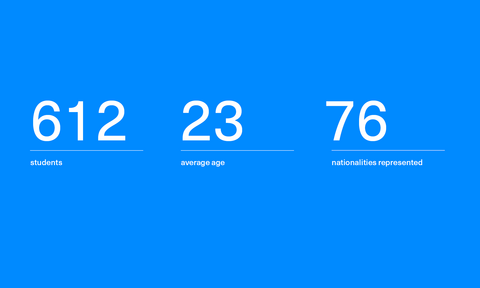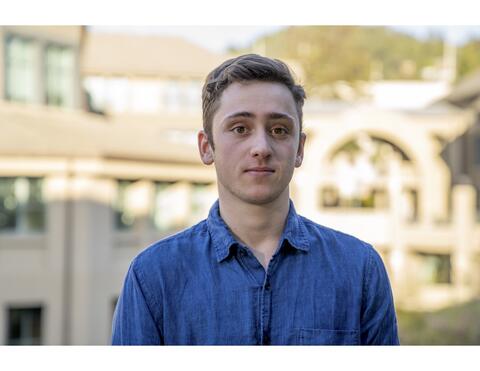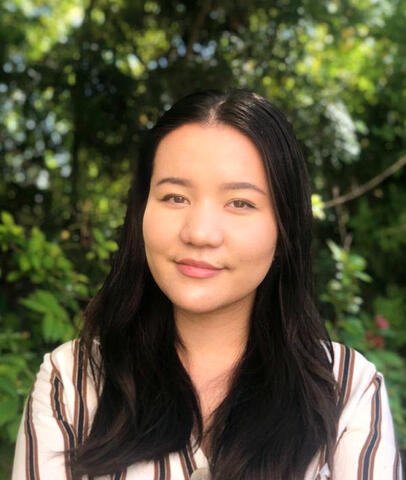
Published
Blog type
September saw the start of a one-year journey at Imperial College Business School for students from our Finance Master’s programmes: MSc Finance, MSc Finance & Accounting, MSc Financial Technology, MSc Investment & Wealth Management and MSc Risk Management & Financial Engineering.
A total of 612 students joined us across these five programmes, bringing with them a breadth of experience from a diverse range of backgrounds, with over 76 nationalities represented across the cohort, and degree backgrounds that span from economics (24%) to business/management (15%) and finance/accounting (23%).
Whether they’re seeking a career in corporate finance, investment banking, wealth management or any other area of finance, our Finance Master’s students will gain a wealth of experience in both quantitative and qualitative fields, helping them develop skills that will propel them into top jobs.

Although students study the majority of their programme separately, shared electives in areas such as Corporate Dealmaking, Entrepreneurial Finance and Real Estate Investment provide an opportunity for all five programmes to study together. Students will also get many opportunities to mingle and socialise across programmes at multiple events held throughout the year which helps them build a robust finance network. There’ll also be opportunity to engage in other extra-curricular opportunities such as the Student Investment fund, which gives students the chance to gain real-world experience in buy-side investments, or the Finance Careers Club, which provides members a platform to build knowledge and skills; while encouraging them to explore their career ambitions across the financial sector, both in London and internationally.
"At the end of every year, I ask students what they enjoyed most about the year. There is a great variety of responses but the one that comes up the most frequently every year is ‘the friends I have made’. As academic director it gives me huge pleasure to think that we are creating an environment that enables real, special friendships to start. Maybe we will all need to work just a little bit harder in this challenging environment, but I am so sure it will be worth it. I know that you have all come from very different backgrounds and – even in your young years –have done some really outstanding things, so there is so much to discover about your fellow students. It is a super rewarding year but it is a tough work year too. So I would suggest that the class of 2020-21 try to be organised from the start. It always amazes me what some students are able to achieve with just some simple thought and planning. One final tip – and this will be especially pertinent this year – remember that even if you receive a hundred rejections and only one job offer that is a success! So approach the job search with a steady determination and do not be put off by early rejections, because these rejections will just make it sweeter when you get that offer in the end. Good luck."

Find out more about the class profile of each Finance Masters’ and meet some of the students on each programme.
MSc Finance
Ranked #1 in the UK* and #9 in the world in the Financial Times Masters in Finance Ranking 2020, MSc Finance is our flagship finance programme. With world class faculty and ongoing relationships with major employers in the finance sector, the MSc Finance equips students with practical experience and the confidence required to present themselves to the world’s top companies.
The programme also helps our MSc Finance students to obtain their Chartered Financial Analyst designation as a member of the CFA University Affiliation Program.
The new class of 2020-21 consists of 81 students of 33 different nationalities. The students are very academic, with 63% possessing a first-class degree. The majority of students join from an economics degree background at 52%, followed engineering/technology at 14% and business/management at 11%.
*excluding multi-campus programmes
Meet MSc Finance students
Claudia Oliver Cortadellas
Nationality: Spanish
Education: MEng Aeronautical Engineering, Imperial College London
What is your main motivation for studying MSc Finance?
Finance has always fascinated me, and after completing an internship within the industry, I realised the many careers paths that one can pursue. Eager to thoroughly explore financial instruments, and to understand how these relate to the industry, I believe the MSc Finance will allow me to explore my interests, and to broaden my perspective of the choices that lie ahead of the programme. Equally, given the complex and competitive nature of the industry, Imperial’s distinguished technical approach to finance will certainly set me at an advantage whilst pursuing my career. Overall, my main motivation is to learn as much as possible; I believe this is crucial to understand my passions and to foster an exciting career.
What are you most looking forward to outside of your studies?
I consider myself very lucky, as having completed my undergraduate degree at Imperial I can assert that Imperial’s possibilities go beyond the academics. The encouragement that the Business School gives to students to engage in societies and in roles of responsibility is amazing. These experiences help students forge strong bonds, which certainly makes your time at Imperial unforgettable. In addition, Imperial’s unique location offers privileged access to one of the largest financial centres in the world, which combined with the Business School’s links with the industry, is a clear advantage when building a professional network.

Jack Traube
Nationality: British
Education: BA Physics, University of California, Berkeley
What is your background prior to studying MSc Finance?
Prior to studying MSc Finance at Imperial, I attended the University of California, Berkeley, where I majored in physics. Although I was a physics major, my internships were in the tech industry. I interned for Adobe as a customer success manager in the Experience Cloud and then as a product intern for a company in the blockchain world, called Hedera Hashgraph.
What do you hope to achieve with the programme?
Coming from physics to finance, my main goal is to figure out what part of finance most interests me. While I have a general idea, I hope this programme will enable me to explore and figure out exactly what direction I want to go in. Other than getting a strong understanding of the theory behind finance, I also really want to learn the necessary tools and frameworks to apply this theoretical understanding into real world situations. With respect to that, I hope to improve my programming skills and learn how to best utilise them to solve complex financial problems. What I am most excited about is the range of electives that we can choose from, which will allow me to really focus on my interests. One particular elective that I am excited about is ‘Blockchain and Crypto Assets’. Finally, I hope to meet a lot of new people and make some lifelong friends. Students on the programme come from all backgrounds and perspectives, so I hope to learn as much as I can from them.
MSc Finance & Accounting
The MSc Finance & Accounting programme is the largest of our Finance Master’s programmes. Accredited by both ACCA and CIMA, the programme prepares students for careers in financial or professional services.
This year’s class of 176 students represent an incredible 45 nationalities. The top countries students join us from on the programme are China, the United Kingdom, Italy, Germany, and India.
A large majority of students on the programme join us from either a finance/accounting background (44%), or business/management background (31%), and a small number of students also undertake this programme after studying in other areas such as medicine or arts/humanities.
Meet an MSc Finance & Accounting student

Anara Kukenova
Nationality: Kazakhstan
Education: BSc Biochemistry, Imperial College London
What is your background prior to studying MSc Finance and Accounting?
I was born and raised in Almaty, Kazakhstan, and I came to the UK in 2015 to do my A-levels. After that, I moved to London to pursue my BSc Biochemistry undergraduate degree at Imperial College London. Over the course of my degree, I have taken part in many finance and entrepreneurship competitions and work experiences. I was also a Student Ambassador throughout my time here, which enabled me to meet many new people and contribute to Imperial's student life.
What do you hope to achieve with the programme?
I believe that in uncertain times, such as this year, the best thing you can do is to take the time to invest in yourself and your education. One of my key reasons for choosing the programme was the wide range of core and elective modules available, from Investments and Portfolio Management to Innovation and Strategy in FinTech. I am very excited to have the opportunity to tailor the programme according to my interests and build up my knowledge of fundamental financial concepts and technical skills. As the world shifts towards digitalisation, it is essential for finance professionals to have strong software and coding skills. I hope to make full use of the coding modules offered on my programme and develop my skills in R, C++, and VBA this year. I believe these are the skills that will become increasingly crucial in any industry in the future.
I am excited to join some of the many clubs on offer at Imperial College Business School and meet like-minded people. Imperial is an incredibly international university, and I am very looking forward to meeting students from all around the world and learning about their stories and cultures.
Last but not least, is, of course, career prospects. As Imperial students, we are incredibly lucky to have a very supportive Careers service and be located in the world's financial capital. This summer, before my programme even started, the Careers team already helped me with CV and cover letter checks, and there were many online resources and workshops available for us to get a head start. I am thrilled to see what this year will bring!
MSc Financial Technology
Now in its second year, our MSc Financial Technology provides graduates with the skills to embark on a successful and exciting career in fintech or in the financial services sector.
This year’s class of 99 students have the most diverse range of backgrounds of any of our Finance Masters’. Between them, they cover business, finance, engineering, science and mathematics fields, with no more than 20% of students joining us from any one of these areas.
In the coming year, the sophomore MSc Financial technology class can expect a programme that combines the intellectual rigour of an Imperial Master’s with a practical understanding of the potential and limitations of cutting-edge financial technology. This means combining strong foundation modules in finance theory and computer science, including machine learning and coding skills, with the latest thinking and innovation in these new technologies.
Meet an MSc Financial Technology student

Parth Bansal
Nationality: Indian
Education: BSc Economics, University of Warwick
What is your main motivation for studying MSc Financial Technology?
As we swiftly move towards a more tech enabled world, I wanted to add to my knowledge and skills in finance by learning about some of the new disruptive technologies and their real-world applications. The MSc Financial Technology is a highly innovative degree which will equip me with relevant coding skills and the ability to use large datasets to conduct analysis, derive insights and predict outcomes. During the programme I will also develop machine learning skills with applications directly relevant to the financial sector, as well as build a good understanding of blockchain technology and its applications. With more and more companies rushing to adopt the latest cutting-edge technologies and embracing this switch from physical to digital, the skills and knowledge gained from the programme are only going to increase in relevance and importance in the future.
What are your future career plans?
I am fascinated by the prospect of integrating the latest developments in technology and the vast amount of data (or rather Big Data), that we are generating to help improve processes, decisions and most importantly lives. Thus, my goal after graduating from Imperial College Business School is to work within the data analytics or technology division of either large investment banks or professional services firms. Such a career path will allow me to apply my skills and knowledge to challenge the status quo and drive innovation.
MSc Investment and Wealth Management
MSc Investment & Wealth Management is designed to prepare students for careers in investment, private equity, and asset management. The programme is both grounded in theory and also highly applied, with the opportunity to find solutions to real-world investment challenges.
This year’s cohort of 90 students consists of 33 nationalities. 50% of whom are from the Asia/Pacific region, with the remainder spread across Europe, the UK, Africa/Middle East, and the Americas. The most common degree backgrounds among MSc Investment & Wealth Management students were economics and finance/accounting, making up 40% and 30% of the cohort respectively.
Meet an MSc Investment & Wealth Management student
Salma Belmaachi
Nationality: Moroccan
Education: BAEcon, Business Studies and Economics, University of Manchester
What is your main motivation for studying MSc Investment & Wealth Management?
During my time as a business and economics undergraduate I had the opportunity to take a diverse range of courses, but my financial modules are the ones that I relished the most. My financial academic background and my work experience as an ESG and Equity Analyst Intern at Amplegest in Paris inspired me to apply to MSc Investment & Wealth Management. This programme is extremely interesting and builds on the skills I acquired in my undergraduate degree. The Investments and Portfolio Management and Derivatives modules appealed to me as I will have the opportunity to implement the various financial theories that I previously studied. I will also acquire new skills like solving case studies using R programming language and valuating complex financial instruments like forwards, futures, swaps, and options. Furthermore, the faculty provides its graduates with the most experienced people.
What are your future career plans?
I strongly believe that this Master’s programme will provide me with the necessary analytical tools and concepts to build a career in the financial services industry, and reach my ultimate goal: acquiring the CFA Charter and becoming a buy-side analyst in an asset management company.
MSc Risk Management & Financial Engineering
Accredited by the Professional Risk Manager’s International Association (PRMIA), MSc Risk Management & Financial Engineering is a highly quantitative programme, tailored to prepare recent graduates for careers in financial engineering and risk management. The programme is designed for technically minded graduates who want to engage in deep, analytical study of risk management and financial engineering.
This programme has a near gender balance – out of the 166 students in this year’s cohort, 52% are female. As might be expected, a large majority (60%) of the students on this cohort come from a mathematics background, with the rest sharing equally quantitative experience in fields such as economics. This year’s class is also extremely academic, with 72% holding a first-class degree.
Meet an MSc Risk Management & Financial Engineering student
Kimberley Xia
Nationality: Chinese
Education: BSc Statistics, Economics & Finance, UCL
What is your background prior to studying MSc Risk Management & Financial Engineering?
I studied my undergraduate at University College London majoring in statistics, economics, and finance with first-class honours. My undergraduate study at UCL reinforced my passion for finance and consolidated my desire to become an elite member of the financial industry. I received thorough training in statistics with a specific focus on economics and finance, which has laid a solid foundation in my knowledge base regarding quantitative methodologies in financial contexts. Moreover, academic experiences, such as case studies and group projects, have aided in the development of my data analysis and financial modelling skills, whilst connecting me with real issues as they arise in the financial industry.
In terms of practical experience, my last internship at KPMG focused on financial risk management advisory where I conducted in-depth market analysis, portfolio stress testing, and derivatives risk management.
What do you hope to achieve with the programme?
I believe the MSc Risk Management & Financial Engineering will help to equip me with a deeper understanding of financial risk management, as well as skills that support my career development. With further instruction on financial engineering offered by Imperial, I believe I can make an impact working in promoting financial risk management and make encouraging financial innovations. Furthermore, the range of available clubs, societies, and conferences I can attend will be helpful to expand my professional network. The alumni network is also be an incredible source of inspiration and global opportunity for me to gain insight into the companies that interest me. Learning with a like-minded group of entrepreneurial individuals is an invaluable experience, and these peers and faculty will form an invaluable network who can help me achieve my goals further down the road.
